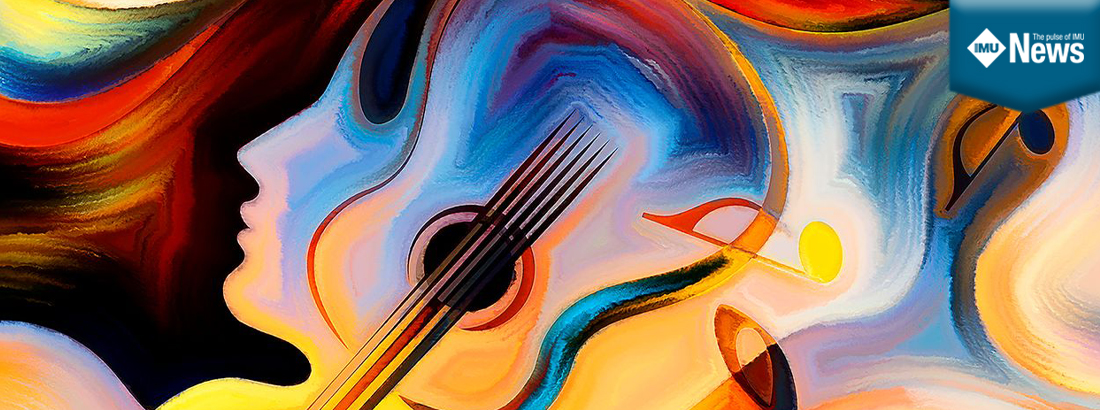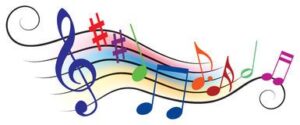It is safe to assume that the birth of music dates back to the very dawn of human existence. The ability to create and relish music is, if anything, a tell-tale feature of our species. The human anatomy equips us with the “tools” to do so – chiefly, the brain. The auditory cortex of the temporal lobe receives electrical signals produced by music and various other sounds. This region mediates perception of pitch, melody, chords and harmony. Musical rhythms on the other hand, are processed by the cerebellum. The frontal lobes then decipher the emotional message cladded in the music. This is the reason why music is largely regarded as being evocative. Over the eras of Western Classical music, major keys; also known as “happy keys”, were said to elicit an elated state of mind. However, minor keys; or “sad keys”, were known to evoke feelings of sorrow.
It is undeniable that music snares a pedestal in numerous cultures; perhaps even tying people of different backgrounds together as a universal language. But, what if you were told that the common folksong or even your favourite track from Lady Gaga’s latest album, had more than a cultural significance? What if music had a therapeutic potential for a vast number of diseases? Well, if this was the case, its potential might not have been obscure to earlier human civilizations. The Greeks hailed the god, Apollo, as the god of music and medicine.[1] This was not a mere coincidence, as music and medicine were said to be entwined. Music was utilized across ancient civilizations as part of healing rituals. Unfortunately, the advent of conventional Western medicine caused its therapeutic influence to wither away. Recent years, however, have witnessed an increasing demand for research on music therapy for a multitude of diseases.
Music is capable of alleviating pain, anxiety and stress. A study conducted by Brunel University in the UK investigated 72 randomized-controlled trials of 7000 post-operative patients in total. Patients who were played music after surgery complained of less pain and anxiety, and hence, were not as likely to require analgesics.
Another study carried out in Denmark on patients with fibromyalgia further consolidates the notion of music as pain relief. Music that was relaxing and personally-chosen diminished pain and improved functional mobility significantly in these patients.[2] The analgesic properties of music are postulated to be the result of opioid release in the brain. Much research to date has verified this theory. One such study used the opioid antagonist, naltrexone. Participants of the study experienced less pleasure from hearing their favourite music when they were administered the drug. This proved that music mediates pleasure and pain relief via an opioid system.[3]
In terms of stress reduction, music seems to exert its effect by lowering blood cortisol levels. Although, this is truer for calming music which also reduces heart rate, blood pressure and respiration by acting on the brainstem. A note of caution, however, that fast-paced and lively music may have the opposite effect.
Thus far, it is the neurological benefits of music that seem to be the most ground-breaking! It has been shown to play a promising role in treatment of Parkinson’s disease by increasing dopamine secretion. Since decades ago, it was established that patient’s with rhythm disorders, like Parkinson’s, were able to steady their gait by walking in the rhythm of a metronome or music. An astounding research in 2017 by cognitive neuropsychologist, Dalla Bella, further investigated this “rhythm phenomenon”. A group of Parkinson’s patients were first given a rhythm test – finger-tapping or walking to the beat of music. The patients were then subjected to a month of music therapy where they had to walk in the rhythm of a folksong for 30 minutes thrice a week. After the intervention, walking speed and step size had improved in patients who had passed the finger-tapping test at the beginning of the study. This showed that music could act as an external stimulus to jump-start the basal ganglia, so it can regulate rhythm once again, provided that it were not severely damaged.[4] On a related note, music broken down into its simplest component – a sound vibration, has emerged as the novel vibroacoustic therapy.
Music is adept at building neuronal connections in the brain. This attribute makes it useful in the treatment of stroke. Patients who suffered a stroke in the speech area of the left brain had recovered better following melodic intonation therapy. Here, patients sang short conversational phrases (e.g. “I am tired”) alternating between high and low pitches, while tapping their normally-functioning left hand to the rhythm. Not only did these patients’ speaking ability improve, but fMRI scans showed an increase in grey matter in the right brain speech centre.[4] Music is also notable for improving memory regardless of whether it is listened to or played. The journal, Gerontologist, published a study on 89 people with early-stage dementia. The results reported that the individuals who sang or heard music possessed a better mood and memory on cognitive assessments. More research is underway for investigating the effect of music on epilepsy. Charyton et al. suggested that music could prevent seizures in epileptics by lessening stress and enhancing frontal-temporal cortical electrical activity.[2]
It does not come as a surprise that music also gives us joy. The elevated mood is induced by an increase in serotonin secretion. This makes it indispensable in the treatment of depression, cancer and other terminal illnesses, where happiness often seems unattainable.[6]
Lastly, aside from its slew of neuroendocrinal advantages, music has a pivotal role in immunology. Researchers have discovered that it bolsters the body’s immune system by increasing production of immunoglobulin A antibody and natural killer cells.[5] Enough said, music has been shown to have exciting prospects for disease prevention, treatment and rehabilitation in the healthcare setting. It is a safe, inexpensive and versatile drug that not only enriches one mentally and emotionally, but also physically! However, much more research needs to be undertaken in the years to come to further elucidate the many mechanisms of action of this wonder drug that still remains a mystery. The glory of music can only be accurately portrayed in a quote by the fabled classical composer, Ludwig van Beethoven “Music is the one incorporeal entrance into the higher world of knowledge which comprehends mankind but which mankind cannot comprehend.” Written by Dr Rashindra Ravindran, IMU Alumnus
| References | |
|---|---|
| 1. | Lippi D, Roberti di Sarsina P, D’Elios JP. Music and medicine. J Multidiscip Healthc. 2010 Aug 16;3:137-41. doi: 10.2147/JMDH.S11378. PMID: 21197362; PMCID: PMC3004608. |
| 2. | Whiteman H. The power of music: how it can benefit health [Internet]. Medicalnewstoday.com. 2015 [cited 2021 May 17]. Available from: https://www.medicalnewstoday.com/articles/302903 |
| 3. | Mallik A, Chanda ML, Levitin DJ. Anhedonia to music and mu-opioids: Evidence from the administration of naltrexone. Sci Rep. 2017 Feb 8;7:41952. doi: 10.1038/srep41952. PMID: 28176798; PMCID: PMC5296903. |
| 4. | McDermott A. Science and Culture: At the nexus of music and medicine, some see treatments for disease. Proceedings of the National Academy of Sciences. 2021;118(4):e2025750118. |
| 5. | Novotney A. Music as medicine [Internet]. https://www.apa.org. 2013 [cited 2021 May 17]. Available from: https://www.apa.org/monitor/2013/11/music |
| 6. | Simon H. Music as Medicine. The American Journal of Medicine. 2015;128(2):208-210. |











